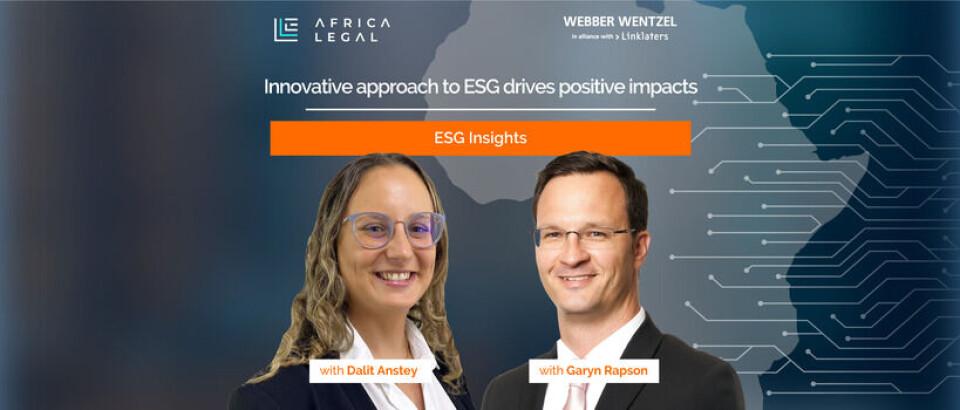Copyright : Re-publication of this article is authorised only in the following circumstances; the writer and Africa Legal are both recognised as the author and the website address www.africa-legal.com and original article link are back linked. Re-publication without both must be preauthorised by contacting editor@africa-legal.com
Innovative approach to ESG drives positive impacts

Winning ESG Initiative of the Year Award at the African Legal Awards for three years in a row, as well as the ESG Legal Adviser of the Year - Emerging Markets award at the 2023 IJGlobal ESG Awards for the second year in a row, suggests that Webber Wentzel’s ESG approach is paying off, writes Ben Edwards.
While many law firms are setting up ESG practices, bundling ESG issues into one dedicated practice area means those firms are not only potentially missing out on opportunities, but may also be failing to advise clients effectively on ESG-related issues. South African law firm Webber Wentzel instead takes a multi-pronged and integrated approach, where all practice areas and sectors incorporate ESG into their advisory work.
“This has really resulted in ownership of ESG across the firm so all of our lawyers are thinking about how ESG affects their practice areas and affects their clients, helping them spot ESG opportunities within their work,” said Dalit Anstey, Webber Wentzel’s ESG knowledge lawyer.
The first year Webber Wentzel won the ESG Initiative of the Year Award was for its pro-bono work supporting the response to the COVID-19 crisis, including its legal support for the National Ventilator Project. The second year was for its work advising TERRAGRN, a company that is developing agroforests from unused or degraded land across Africa. This year the award was for its work supporting the Minerals Council of South Africa's partnership to tackle gender-based violence in mining communities.
The firm’s commitment to ESG across their transactions and advisory work also earned them the ESG Legal Adviser of the Year - Emerging Markets award at the 2023 IJGlobal ESG Awards for the second time. In its submission for the award, Webber Wentzel said: "We are passionate about providing clients with innovative, practical, and meaningful advice to guide them along their ESG journeys. We are extremely proud of our work in the ESG space as it affirms our deliberate steps to living our purpose of making a transformative and sustainable impact through our work and actions."
All of that underscores the cross-practice breadth of the firm’s ESG work, Anstey says, but it also reflects a growing focus on ESG issues across the continent among governments and companies alike.
“Africa is incredibly vulnerable to the impacts of climate change, even though we didn’t necessarily cause a lot of the challenges. But we are starting to see a lot of African governments now creating regulatory frameworks around this,” Anstey pointed out.
“Some smaller and mid-size companies probably see ESG as another headache that they need to face, but over the last two years we’ve definitely seen a mindset shift among clients and an appreciation that they need to take these issues seriously,” commented Garyn Rapson, a partner and head of environmental law and ESG at Webber Wentzel.
Larger companies and industries are also understanding their responsibilities to their local communities and see that simply leaving municipalities to deal with problems such as dire poverty and a lack of services risks becoming a licence-to-operate issue, explained Rapson.
“Having decent structures in place will actually prolong the longevity of your business and help reduce disruptions,” he pointed out.
The type of ESG work is also evolving as concerns around sustainability move beyond renewable energy and decarbonisation.
“Over the next few years we’re going to start seeing that shift into other infrastructure areas such as water and waste efficiencies and reducing reliance on fresh water for sites and having more captive water solutions,” Rapson noted.
Against this backdrop, other ESG-related innovations are emerging, including new green financing solutions such as debt-for-nature swaps where sovereigns can access cheaper debt in return for protecting key ecosystems. Bioeconomy initiatives are also likely to become more prominent, such as biodiversity credits, which work in a similar way to carbon credits but protect against habitat loss and other environmental threats.
“The fact that our ESG work is booming is a testament to the fact that this is becoming an important area for clients,” Anstey concluded.
To join Africa Legal's mailing list please click here
